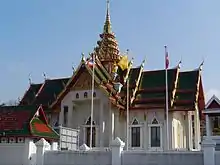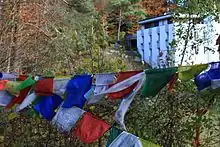Buddhism in Switzerland
According to the 2000 census of Switzerland, 21,305 Swiss residents (0.29% of the total population) self-identified as Buddhists. About a third of them were born in Thailand.


History
In 1978 the Swiss Buddhist Union (Schweizerische Buddhistische Union / Union Suisse des Bouddhistes / Unione Buddhista Svizzera) was founded by the Czech Buddhist Mirko Fryba.
The German Buddhist Nyanatiloka was an important early Buddhist in Switzerland and who planned to found a Buddhist monastery there. The writings of Swiss psychologist Carl Gustav Jung have many allusions to Buddhism. Max Ladner founded a Buddhist group in Zurich in 1942. In 1948, Ladner published the Buddhist journal "Die Einsicht".
Geshe Rabten Rinpoche founded in 1977 in Mont Pèlerin a Buddhist monastery and study centre for European monks, nuns and lay people as well. Switzerland also has Tibetan-Buddhist and Zen monasteries, among them the Tibet Institute Rikon located in Zell-Rikon im Tösstal in the Töss Valley in the canton of Zürich.[1]
In 2003 the Theravada temple Wat Srinagarindravararam in Gretzenbach was dedicated by Princess Galyani Vadhana, the daughter of the Princess Mother Srinagarindra, after whom the temple was named.
In earlier censuses, Buddhism figured together with other non-Abrahamic traditions (mainly Hinduism) as "other churches and communities". These accounted for 0.12% in 1970, 0.19% in 1980, 0.42% in 1990 and 0.78% in 2000 (0.38% Hinduism, 0.29% Buddhism, 0.11% other).
References
- "Tibet Institute Rikon: History". Archived from the original on 2013-12-27. Retrieved 2009-12-17.
- 2000 census results (Swiss federal statistics office)
Further reading
- Baumann, Martin (2000). "Buddhism in Switzerland", Journal of Global Buddhism 1, 154-159.
- Weigelt, Frank-André (2009). "Dokumentation: Buddhismus in der Schweiz. Eine Kurzdarstellung", Schweizerische Kirchenzeitung 45, 774-778
See also
External links
.svg.png.webp)